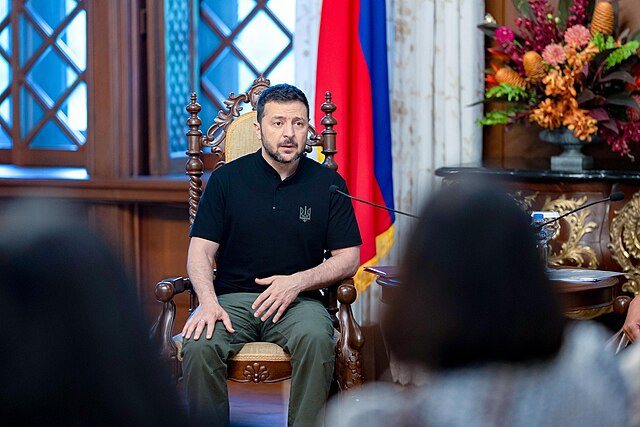In a significant escalation of the ongoing conflict between Ukraine and Russia, Ukrainian President Volodymyr Zelenskyy announced that Ukrainian forces have gained control over 74 settlements in Russia's Kursk region. This assertion marks a daring cross-border operation that highlights Ukraine's continued military capabilities more than two years into Russia's invasion.
During his evening address on Tuesday, Zelenskyy confirmed that Ukrainian forces were advancing into the Kursk region and capturing Russian soldiers. "There are 74 settlements under the control of Ukraine," Zelenskyy stated, underscoring the progress made in this unexpected incursion. He framed the operation as a demonstration of Ukraine's ability to seize the initiative and shape events on the battlefield.
This offensive has proven to be a major embarrassment for Russia, with the Kursk region's Governor Alexei Smirnov acknowledging on Monday that Ukraine had control over 28 settlements. However, Ukrainian military officials, including General Oleksandr Syrskii, claim that their forces now control 1,000 square kilometers (approximately 386 square miles) of Russian territory. Syrskii reassured the public that Ukrainian troops are "fulfilling their tasks" and that the situation remains "under our control."
The surprise attack on Kursk has not only displaced over 100,000 people but has also forced Russia to rapidly deploy reserves and bolster its defenses. Russian military units, supported by aircraft, drones, and artillery, have reportedly halted Ukrainian armored groups from advancing further into the Kursk settlements of Obshchy Kolodez, Snagost, Kauchuk, and Alexeyevsky, according to a statement from Russia's defense ministry.
As the conflict drags on, with Ukrainian forces increasingly fatigued and Western support under political scrutiny, this raid might be a calculated move to pressure Russia into negotiations. Mykhailo Podolyak, a senior adviser to Zelenskyy, suggested that the operation was designed to force Russia to the negotiating table, emphasizing that "simple calls to Russia do not work" and that "only a set of coercive tools" can yield results.
The raid has further strained international relations, with Russia condemning Ukraine's Western allies for their silence on the offensive during a United Nations Security Council meeting on Tuesday. Russia's Deputy U.N. Ambassador Dmitry Polyanskiy criticized Ukraine's supporters, including the United States, France, and Britain, for not denouncing the incursion, accusing them of "covering up the abhorrent crimes of their puppet."
Polyanskiy expressed frustration at the lack of condemnation, questioning how the targeting of civilians could be justified under the pretext of disrupting attacks on Ukrainian territory. "I would be grateful for the explanation of how intentionally targeting civilians serves the goal of disrupting attacks on Ukrainian territory," he said, referring to allegations that Ukrainian forces had struck non-military targets in Kursk.
Despite these accusations, Western diplomats at the U.N. remained steadfast in their support for Ukraine. American diplomat Caleb Pine reaffirmed that Russia was the country guilty of "numerous well-documented atrocities, including war crimes and crimes against humanity, on Ukraine's sovereign territory." Similarly, French and British diplomats reiterated their commitment to Ukraine's sovereignty and territorial integrity within its internationally recognized borders.
France's Clarisse Paolini and Britain's Kate Jones both underscored their nations' unwavering support for Ukraine, with Jones stating, "We will never falter in our support for Ukraine for as long as it takes to secure just and sustainable peace based on the principles of the U.N. Charter and international law."
Russia's complaints at the U.N. were echoed by allies such as Syria, Belarus, and North Korea, who spoke in favor of Moscow's position. However, the broader international community has largely viewed Russia as the aggressor in the conflict, particularly given its 2022 invasion, which has resulted in widespread devastation and the displacement of millions of Ukrainians.




